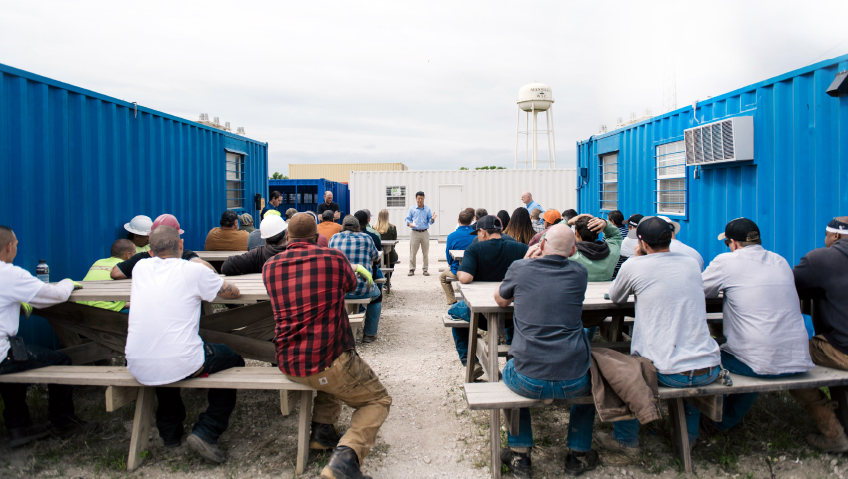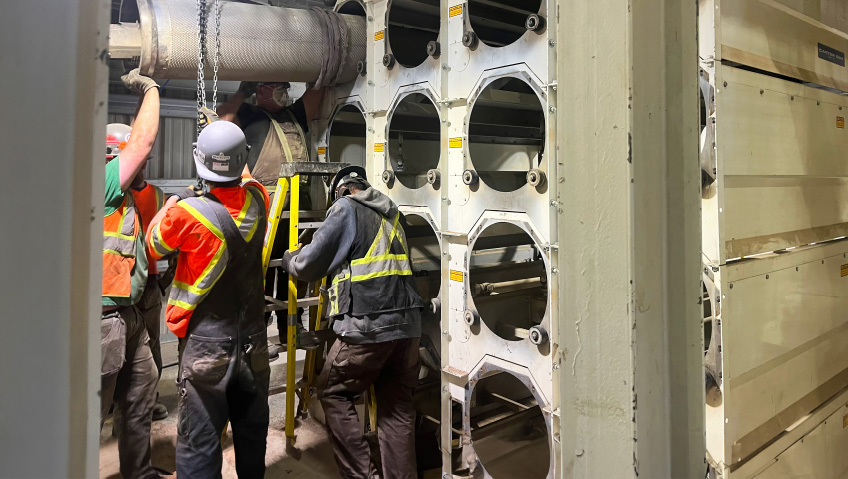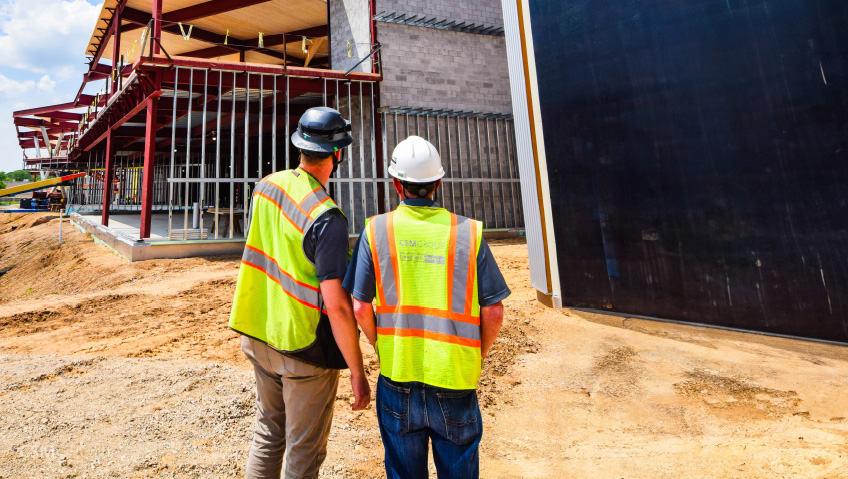Looking back on over two successful decades in business, Stephen Shang has seen modified shipping containers develop from a niche market into practical, real-world solutions for everything from storage to work and living spaces.
“We’re definitely a business, but we want to be a business that stands for something,” says CEO Shang. Co-founding Falcon Structures with his friend Brian Dieringer in 2003, Shang says demand for modified shipping containers keeps growing along with emerging markets, including shelter and portable restrooms for people working outdoors in the elements.
Employing about 90 factory workers and serving customers who themselves own construction companies and other businesses where staff work outdoors, Shang is in a unique position. Recognizing his own staff for their hard work and dedication, he is keenly aware of the increasing need for employees to be respected, but also protected.
In recent years, demand for bathrooms, locker room containers, and workforce housing has created some of Falcon’s most successful markets, for one simple reason. With many companies facing workforce shortages, the big issue has become not just attracting new employees, but keeping them.
Customers served include an air freight carrier handling thousands of packages every week. Boxes and packages are removed from planes year-round, and in the blistering summer heat, workers on runways used to huddle in the shade of airplane wings for a temporary reprieve. Driven by the tough conditions, many quit.
“Even though it’s a little bit cooler under an airplane wing, you don’t have a water cooler or anything to drink,” comments Shang. The solution? The provision of finished shipping containers serving as portable breakrooms, outfitted with benches and climate control to provide tarmac employees with cooling or warming as needed. Such shelters afford workers the ability to get out of the elements, prevent them from having to walk too far, and serve as a rest area with water. The move is, says Shang, a step in the right direction.
“Companies are starting to pick up on this trend that to get and retain these workers—who are instrumental in our economy—you have to take better care of them, and a lot of our product line is about taking care of employees,” he says.
For example, instead of staff being sent home dirty and covered in dust from work, they now have container locker rooms, a place to clean up at the end of the day. “That’s been a big push of Falcon’s for the last several years, and we’ve had good market traction with that,” says Shang. “And it makes us feel good that we’re doing good for workers out there.”
On occasion, Falcon’s modified shipping containers can help keep workers and even their families healthier as well. One of the company’s clients is a large battery recycling plant about an hour outside Kansas City. Along with staff working in a dirty environment, there was also the issue of being around lead and other toxins that are especially harmful to children. Falcon created a 10-container locker room, which has done wonders for health, safety, employee retention, and morale.
“I think the industry is uniquely positioned to solve a lot of those problems,” he says. In locations such as remote Texas oil pipeline projects, modified shipping containers are ideal for creating restrooms. “You’re not going to get general contractors out there to build a bathroom,” he says, “but you can build it in a factory and have a turnkey solution for employees.”
Other issues that have been improved through Falcon’s container-based structures include productivity and accommodating female workers. Automobile and other factories are massive, and it isn’t unusual for workers to walk 10 minutes to get to the bathroom. By strategically siting modular bathrooms in factories for easy accessibility, employee morale and productivity are boosted. And then, there’s the matter of dignity. In a time of staff shortages, companies are trying to attract more women to the blue-collar workforce. By supplying these businesses with female-only restrooms and change rooms, they don’t have to share bathrooms with men.
“This gives them their own space, which will attract more women because you’re showing them they matter,” says Shang. “They are comfortable spaces that can also be lactation rooms. Again, it’s all about recognizing women, not overlooking them.”
Instrumental in recognizing the many possibilities of container-based structures early on, Shang became involved with the respected Modular Building Institute (MBI). Founded in 1983, this global, non-profit trade association counts contractors and general contractors, manufacturers, owners/developers, architects, and dealers among its members in two segments: permanent modular construction (PMC), and relocatable buildings (RB).
In 2016, Shang made presentations to the MBI on the need to make container-based structures safe and code-compliant. This saw the creation of task forces, with Falcon playing an important role with the International Code Council (ICC) committees on incorporating shipping containers into the building codes. Shang served as Chair of the MBI’s Government Affairs Committee and is currently Vice President. He will become the incoming President in March 2025.
In the coming years, Shang sees Falcon continuing to create modified container structures for workplaces, storage space, bathrooms and locker rooms, and many other markets. With the shortage of affordable housing across North America, shipping containers can even provide living spaces to help alleviate this problem.
Another area well-positioned for growth is the electric vehicle (EV) industry infrastructure, including charging stations. “I think a lot of that infrastructure is best built modularly, as opposed to trying to build a bunch of these small EV stations using on-site construction,” he says.
Indeed, for many project types, the biggest advantages of modified containers are speed and efficiency of construction. Created at Falcon’s factory on a 50-acre site in Austin, Texas, these containers are cost-effective, generate much less waste than conventional building materials, can be built simultaneously with site prep, and can be assembled in a streamlined manufacturing environment. Even working at Falcon Structures constructing its products provides many benefits to employees. Unlike regular construction projects, often in remote locations, Falcon’s staff come to the same workplace every day. There are no slowdowns through bad weather, shortages of materials, or delays while waiting for other trades to arrive.
“In a factory environment, you constantly have things to do and product moving through,” says Shang. “This means a much more stable lifestyle, and it’s been great for our employees.” While he is mindful of growing the company, Shang remains passionate about fostering a safe and positive workplace for Falcon employees.
Falcon foresees a future where modular will play a greater role in construction. Australia, Asia, and some European nations already see 15 to 18 percent of their construction being modular. In the United States, although growing, the figure is only around six percent.
“I would love to see the continued adoption of modular, because it’s a better way to do some construction, although not all,” Shang says. “You’re not buying a kit and building an iPhone with a couple of buddies at Denny’s; it’s built in a factory. So why not build a lot of the structures in which we work and live in a factory?” he posits.
“It’s not just a business change, it’s a cultural change, and in some applications, a better way. It’s not just good for the business or the owner, but good for the environment and employees. There are a lot of great things about modular. My hope for Falcon, and the industry as a whole, is that the trend continues.”






